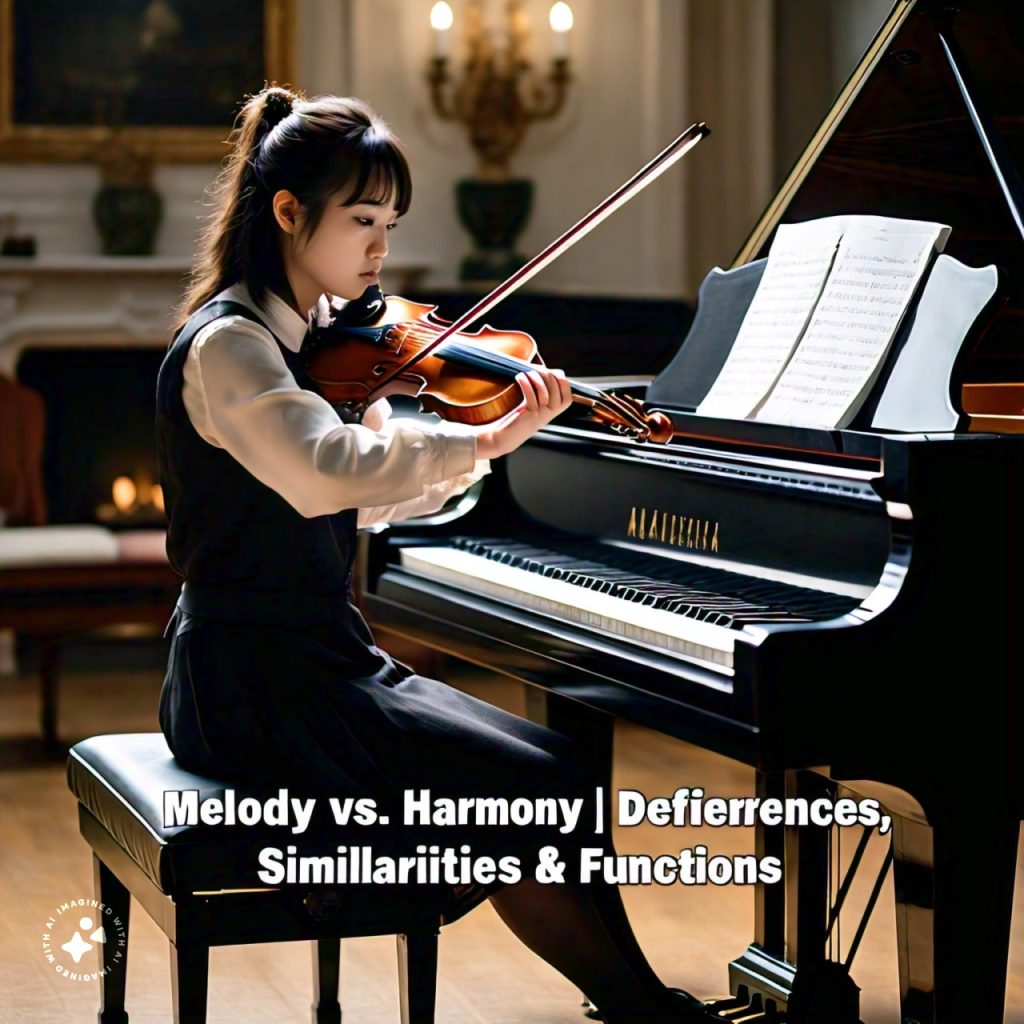Hello, are you a Songwriter or a singer and you want to know the difference between Melody and Harmony? Well, you are on the right page because here in this post, we are going to talk about”Melody vs. Harmony | Definition, Differences, Similarities & Functions.
We all know that Music is a universal language that transcends borders and cultures and weaves its magic through a tapestry of sound. But have you ever stopped to wonder what truly makes a song tick? What elements come together to create those unforgettable melodies and rich textures that leave us humming along or lost in emotion? The answer lies in the beautiful dance between melody and harmony.
As a singer-songwriter for many years, I’ve spent countless hours dissecting these fundamental building blocks of music. Today, I want to share that knowledge and guide you on a journey to understand melody vs. harmony. We’ll explore their definitions, delve into the key differences and surprising similarities, and finally, unveil how they work together to create the captivating world of music we all cherish.
What is Melody?
-
Monotone: A single pitch repeated over time
-
Polyphonic: Multiple independent melodies played simultaneously
-
Homophonic: A single melody accompanied by chords or harmonies
Imagine the lead singer belting out the unforgettable chorus of your favorite song. That, my friends, is a melody in its purest form. It’s the main musical line, the voice that carries the tune and sticks in your head long after the music stops. It’s the part you can easily hum or sing along to, even if you don’t know all the lyrics.
Think of a melody as a horizontal journey. It unfolds one note after another, creating a sequence of pitches that define the song’s core identity. A melody is like a captivating storyteller weaving a tale through its rise and fall, its moments of joy and sorrow, all conveyed through the language of musical notes.
Characteristics Of Melody
- Memorable tunes
- Sequential progression
- Catchy motifs
- Singable phrases
Importance Of Melodies in Music
- Melody is crucial in capturing listeners’ attention and creating a musical identity for a song or composition. It serves as the focal point that listeners connect with emotionally.
- In songwriting, the melody often serves as the foundation upon which lyrics and harmonies are built. It guides the overall mood and theme of the song, influencing its impact on the audience.
What is Harmony?
-
Vertical harmony: Chords and chord progressions
-
Horizontal harmony: Melodic lines moving in parallel motion
-
Chord progression: A series of chords played in a specific order
Imagine a melody as the soloist on stage, captivating the audience with their performance. Harmony is the entire orchestra backing them up, adding depth, color, and emotional weight to the music. Chords, which are combinations of notes played together, are the building blocks of harmony. By carefully selecting and arranging these chords, musicians create a harmonious foundation that elevates the melody and shapes the overall mood of the piece.
Characteristics Of Harmonies
- Memorable tunes
- Sequential progression
- Catchy motifs
- Singable phrases
Importance Of Harmonies in Music
- Harmony adds depth, richness, and emotional complexity to music. It creates depth and complexity, elevating the overall musical experience.
- In songwriting, harmony provides the backdrop against which melodies shine. It adds emotional depth, tension, and resolution, enhancing the overall impact of the music.
Key Differences Between Melody and Harmony
-
Structure: Melody is a linear sequence of pitches, while harmony is a combination of pitches sounding simultaneously.
-
Function: Melody provides the main theme or hook, while harmony adds depth and emotion.
-
Sound: Melody is often more prominent, while harmony provides a supporting role.
Similarities Between Melody and Harmony
-
Pitch: Both melody and harmony rely on pitches and pitch relationships.
-
Rhythm: Melody and harmony often share the same rhythmic patterns.
-
Timbre: The tone, color, or quality of the sound affects both melody and harmony.
Functions of Melody and Harmony in Music

-
Emotional impact: Melody and harmony work together to evoke emotions and convey meaning.
-
Cohesion: Melody and harmony help create a sense of unity and structure in music.
-
Style and genre: Melody and harmony are crucial in defining different musical styles and genres.
How Melody and Harmony Work Together
By now, you might think of melody and harmony as opposing forces. But fear not, music lovers, for the beauty lies in their collaboration. They are not rivals but rather complementary partners in the grand symphony of music.
Harmony exists to support and enhance the melody. It provides a foundation, a bed of sound that allows the melody to shine brighter. Imagine a delicate melody floating on a bed of lush chords, creating a sense of emotional depth and richness.
Think of a song you love. Can you isolate the melody in your mind? Now, imagine it stripped of its harmonic backing. Chances are, it wouldn’t be quite as captivating. Harmony adds layers of complexity, texture, and emotional weight that elevate a simple melody into something truly special.
How To Create Your Own Music With Melody and Harmony
Understanding melody and harmony is not just for music theory nerds (although they’re pretty cool too!). This knowledge empowers you to create your own music, whether you’re a budding songwriter or enjoy exploring the wonders of sound.
Here are some tips to get you started:
-
Start with Simple Melodies: Don’t try to write a Beethoven symphony right away. Begin by crafting simple, catchy melodies that you can easily hum or sing.
-
Experiment with Chords: Explore different chord progressions and see how they affect the overall feel of your melody. Many online resources and tutorials can help you get started with basic chords.
-
Listen Actively: Pay close attention to the music you love. Try to identify the melodies and harmonies at play. See how they work together to create a cohesive and engaging piece.
-
Use Technology: There are many music creation apps and software programs available today that can help you experiment with melodies and harmonies. These tools can be a great way to learn and create in a user-friendly environment.


